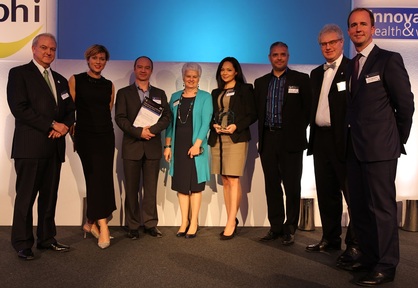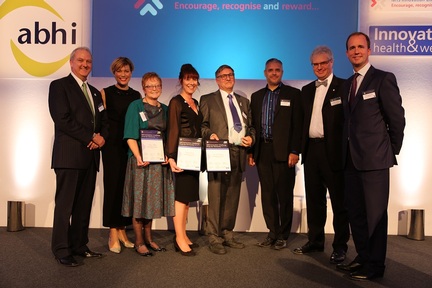NHS Innovation Challenge Prize for Dementia winner announced

A Staffordshire based GP-led service has won the NHS Innovation Challenge Prize for Dementia and will receive £80,000 to further its positive impact across the NHS.
The ‘Memory First’ service won first place for its innovative approach to dementia diagnosis times which has resulted in a cut in the average diagnosis time from three years to four weeks and is saving nearly £500m per year.
Launched in February, the challenge was created by a partnership between Janssen Healthcare Innovation (JHI) and NHS England to reward people reacting innovatively to improve the front line services used by people with dementia in the NHS both directly and indirectly.
Jeremy Hunt, Secretary of State for Health, said: “With the G8 Summit in London on 11 December, it’s important that innovation sits at the very heart of the way health and care services work. We have seen some inspiring examples demonstrating how care for people with dementia can be transformed. Dementia is one of the biggest challenges we face both nationally and internationally, and I am delighted that the UK is leading the way forward for innovation to deliver better care.”
Janssen Healthcare Innovation (JHI) is the first pharmaceutical firm to work with the NHS on a prize like this and has funded the total prize fund of £150,000 to enable winners to move forward and further develop their approaches to joined up care.
Marco Mohwinckel, partner at Janssen Healthcare Innovation EMEA, stated: “Janssen Healthcare Innovation is proud to be the first industry partner for the NHS Innovation Challenges to help support and seed innovation in dementia care across the UK. We are committed to working in partnership to drive change in this area of great need and to help improve the quality of care for both patients and their carers.”
The prize money will allow the winning services to roll out their prized model of care across the NHS to address areas where inequalities lie.
The money will also allow the services to work with external partners and further improve as well as provide opportunities for key innovators to talk at events presenting their findings, share good practise and use their sustainable solutions to overcome disparity in the NHS.
After being launched in February, the second stage in May revealed the key area for improvement in dementia care, applicants were required to address, was improving integrated care.
Over 90 applicants submitted their entries for the first stage and took on the challenge to improve integrated dementia care in the NHS.
Entrants were required to show how their team of multidisciplinary professionals ranging from GPs to specialist nurses and social workers were working seamlessly together to provide integrated care.
The three prize winners were recognised for presenting evidence based services which are providing on going improvements to the care people with dementia are receiving.
The panel of independent judges found Staffordshire’s ‘Memory First’ had a pioneering approach to joined up dementia care by increasing detection rates from 38 per cent to 100 per cent in predicted cases and improving the overall user experience across 162 GPs in 41 local practices for 280,000 patients.
Dr Ian Greaves of Gnosall Surgery, Stafford Memory First Service, said: “With an ageing population, the old models of dementia care are not sustainable. A tsunami of frail elderly is threatening to engulf and bankrupt the NHS. Carrying on in the same way is simply not an option.”
Sharing joint second place were the multidisciplinary teams running the Greenwich Advanced Dementia Service (GADS) and the Early Intervention Dementia Service (EIDS) in Worcestershire, both receiving a prize of £35,000.

Greenwich Advanced Dementia Service (GADS) was recognised for being a service which helps people with dementia stay in their own home for longer and maintain a good quality of life, saving up to £265,200 a year on reduced care home costs and hospital admissions.
GADS has also improved the lives of carers by helping to reduce their stress levels associated with caring for someone with dementia.
Estelle Frost, service director, Oxleas NHS Foundation Trust, Greenwich Advanced Dementia Service, said: “We recognised that increasing carer resilience was the answer to enabling more people to live and die at home and developed a service with this aim in mind.”
Early Intervention Dementia Service (EIDS) in Worcestershire won the £35,000 prize for demonstrating work which has allowed 2,000 patients get a more timely diagnosis of dementia giving people a better chance to prepare and deal with the diagnosis.
EIDS has also helped patients have a greater choice and understanding of their care options available to them by ensuring a timely diagnosis is reached.
Dr Bernie Coope, Worcestershire Health and Care NHS Trust, Early Intervention Dementia Service, said: “The focus is on giving people a timely diagnosis rather than an early one. In this way we ensure that the patients and their families are better prepared to accept the diagnosis and take an active role in planning their own care.”
With the G8 dementia summit now two weeks away, it is hoped the success of the prize can be used to highlight the positive things being done in the NHS which can innovate dementia care both in the UK and globally.
Organisers are hopeful the NHS Innovation Challenge Prize for Dementia will now become an annual event which will see the NHS go on to work with other industry partners.
Latest Features News
 25-Nov-19
2019 Election: Boris Johnson leaves social care in 'too difficult box' but Labour vows to end 'crisis'
25-Nov-19
2019 Election: Boris Johnson leaves social care in 'too difficult box' but Labour vows to end 'crisis'
 18-Oct-19
Podcast: Wendy Mitchell and dementia: 'My biggest fear is not knowing who my daughters are'
18-Oct-19
Podcast: Wendy Mitchell and dementia: 'My biggest fear is not knowing who my daughters are'
 27-Sep-19
Exclusive: Care minister backs care workers' call for time off to grieve and attend funerals
27-Sep-19
Exclusive: Care minister backs care workers' call for time off to grieve and attend funerals
 19-Sep-19
Podcast: Gyles Brandreth says poetry helps ward off dementia
19-Sep-19
Podcast: Gyles Brandreth says poetry helps ward off dementia
 30-Aug-19
Edinburgh Fringe funnyman joins comics facing toughest audience at care home gig
30-Aug-19
Edinburgh Fringe funnyman joins comics facing toughest audience at care home gig